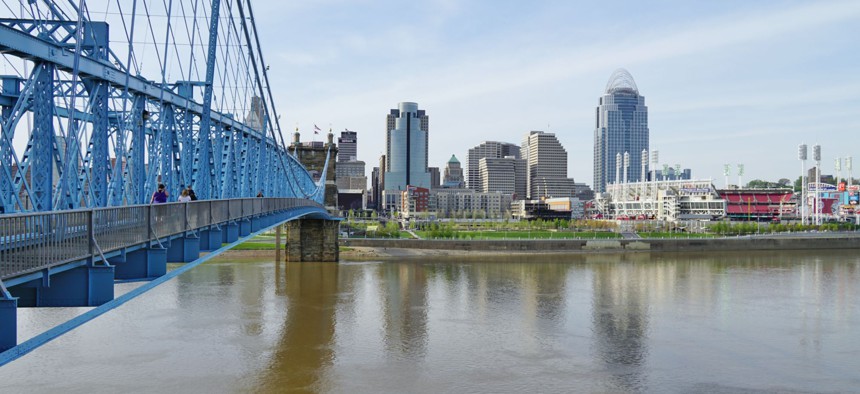Cincinnati Seeks P3 Deal to Develop a ‘Wi-Fi Superhighway’

Cincinnati, Ohio Shutterstock
“We want the marketplace to organically build this thing out,” according to City Manager Harry Black.
The city of Cincinnati is seeking a private partner to build and operate a citywide high-speed, broadband internet network.
"What we're doing here, through a public-private partnership, is we're going to begin the process of basically creating a broadband, Wi-Fi superhighway throughout the entire city, starting with our central business district,” City Manager Harry Black told Route Fifty on Thursday.
Black said the envisioned system would predominantly rely on wireless broadband technology.
Part of what Cincinnati wants from the deal is cost-free internet access for some city buildings, public spaces like schools and community centers, and residential buildings where internet access is now limited by unaffordable costs or poor connections.
The city also plans to eventually link some of its own IT systems to the network, according to Black.
Cincinnati would make public infrastructure available for the broadband build-out. For instance, antennas, cable or other broadband equipment could be installed on lamp posts, municipal buildings, within city conduit, or along the Cincinnati Bell Connector streetcar line.
The city owns and controls thousands of poles, streetlights, traffic signals, bus shelters, fire hydrants and other structures within public rights-of-way in places the broadband network would target, according to a “request for qualifications” issued for the project earlier this week.
Cincinnati is looking for a partner that can deliver network speeds at or above 1 gigabit per second to residential and commercial buildings, along with “readily available” Wi-Fi services to city residents, businesses and visitors in busy areas.
The idea with the project, Black explained, would be to subsidize some free broadband services, public Wi-Fi for example, with money generated from commercial use of the internet network. The private partner would work out a revenue-sharing agreement with the city.
For now it’s too early to know how exactly the money-making structure of the partnership arrangement might look.
"We're not trying to be prescriptive in how we do this,” Black said. He added: “We want the marketplace to organically build this thing out.” This week’s request for qualifications is an initial step in that process. The deadline for vendors to respond to the request is May 5.
After the city receives and reviews the responses, it will issue a request for proposals to a select group of vendors, which could lead to one or more contracts.
Black noted that the project is part of a broader “smart cities” initiative in the city.
“As a city government we're always looking to add value and to innovate,” he said. “Initiatives like this make the city a stronger city, make the city a more attractive city, thereby making it a more competitive city.”
Bill Lucia is a Senior Reporter for Government Executive’s Route Fifty and is based in Washington, D.C.
NEXT STORY: Long Beach Showcases Water-Efficient, Drought-Tolerant Gardens






